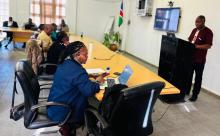Namibia conducts its first Early Action Review for Cholera
From 21 to 23 July 2025, Ministry of Health and Social Services (MoHSS), supported by the World Health Organization (WHO), conducted Namibia’s first-ever Early Action Review (EAR) for the cholera outbreak in Opuwo. This review followed the declaration of a cholera outbreak in Opuwo Health District, Kunene Region on 19 June 2025. In response, it became essential for stakeholders to coordinate efforts to contain the spread of the disease and mitigate its impact on affected communities.
The EAR was conducted with technical guidance from the WHO African Region team and brought together key partners, including UNICEF, the Africa Centres for Disease Control and Prevention (Africa CDC), the Office of the Prime Minister, and the Ministry of Agriculture, Forestry, Water and Land Reform. The process provides an agile framework to measure the timeliness of detection, investigation, notification, and response systems, ensuring that coordinated and rapid actions are taken during public health emergencies.
The review focused on the ongoing cholera outbreak response, bringing together health experts and key stakeholders both in person and virtually, with some participants connected through the Digital Learning Platform at the Public Health Emergency Operations Centre (PHEOC). Additionally, it also assessed the efficiency of initial detection and subsequent responses measures to the cholera outbreak.
During the sessions, an update on the epidemiological situation was presented, including the district’s Incident Management System (IMS) structure. Using the WHO Early Review toolkit, participants evaluated the 7-1-7 performance metrics (seven days for detection, one day for notification, and seven days for response), identifying bottlenecks and enablers across different response pillars. Stakeholders then prioritized remedial actions, assigned responsibilities for immediate activities, and outlined the remaining early response tasks.
An Outbreak Improvement Response Plan was developed to guide ongoing efforts, and the Cholera Incident Action Plan was updated based on these prioritization exercises and the outbreak intervention measures. WHO remains committed to supporting Namibia’s cholera response to safeguard public health.



